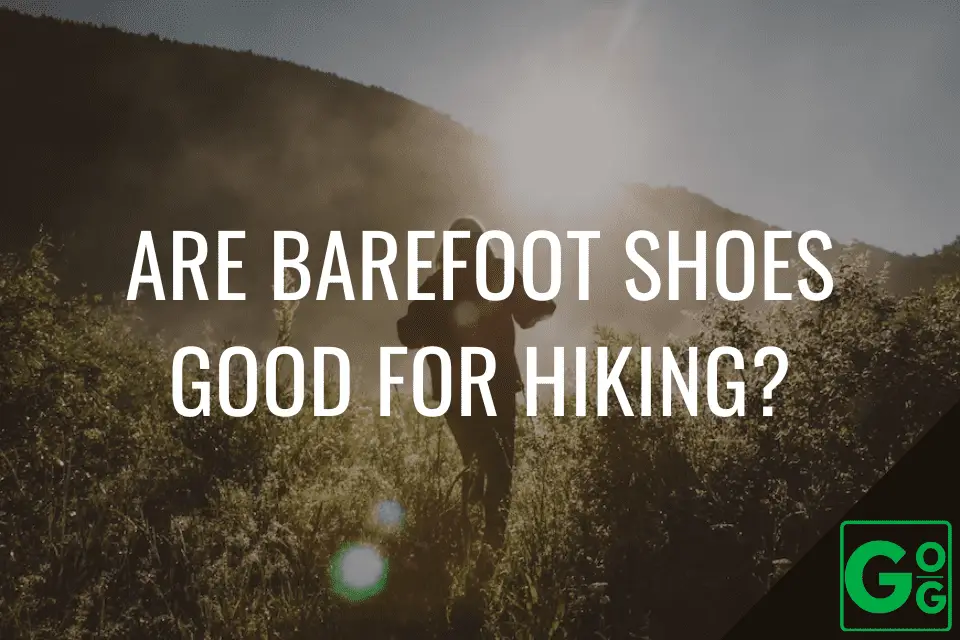We support our blogging by participating in affiliate programs. We may receive a small commission if you click through a link in this post and purchase something you need, however, this will have no impact on the price you pay for the item. Learn more about it on the Disclosure page.
There are many different types of shoes that are marketed as being good for hiking, but one style that has become increasingly popular in recent years is barefoot shoes. These shoes are designed to mimic the feeling of walking barefoot and proponents of the barefoot movement claim that it is better for your feet and posture. But are barefoot shoes good for hiking or not? In this guide, I will answer this and some other barefoot shoe-related questions.
Key Takeaways:
- Barefoot shoes are good for hiking and can help you avoid injuries
- Don’t rush into using barefoot shoes too soon for hiking. They can feel very different to normal shoes and hiking boots, so ease your way into using them to avoid potential muscle damage

What Is the Point of Barefoot Shoes?

Barefoot shoes are a type of footwear that is designed to mimic the sensation of walking or running barefoot. While traditional shoes rely on support and cushioning to protect the feet, barefoot shoes allow the foot to move more naturally and with fewer restrictions.
There are a number of benefits associated with barefoot shoes, including improved balance and posture, increased muscle strength and flexibility, and reduced impact on the joints. Additionally, many people find that wearing barefoot shoes can help improve their overall sense of well-being.
Despite these potential benefits, barefoot shoes are not for everyone. It is important to consult with a doctor or podiatrist before making the switch, as some people may be more susceptible to injury when wearing these types of shoes. Ultimately, whether or not to wear barefoot shoes is a personal decision that should be based on individual needs and preferences.
Can You Wear Barefoot Shoes Every Day?
Yes, you can wear barefoot shoes every day! In fact, many people do just that. Barefoot shoes are becoming increasingly popular, as more and more people are discovering the benefits of going barefoot.
Barefoot shoes allow your feet to move naturally and freely. They provide better support for your arches and help to improve your balance. Additionally, they can help to strengthen the muscles in your feet and lower legs.
Of course, you don’t have to wear barefoot shoes all the time. But if you’re looking for a comfortable, healthy option for everyday footwear, barefoot shoes are a great choice!
How Do You Walk with Barefoot Shoes?
Barefoot shoes are a type of footwear that is designed to allow you to walk without the use of traditional shoes. This can be a great way to get exercise and fresh air, but it is important to know how to walk correctly with barefoot shoes before you start using them. Here are a few tips on how to walk with barefoot shoes:
- Start by walking around your house in barefoot shoes. This will help you get used to the feeling of walking without traditional shoes.
- Once you are comfortable walking around your house, try walking outside in barefoot shoes. Start with short distances and gradually increase the distance as you get more comfortable.
- Pay attention to your posture when you are walking in barefoot shoes. It is important to keep your back straight and your head up.
- Start walking barefoot on soft surfaces such as grass, sand, or carpet. When you are comfortable walking on these soft surfaces, try harder surfaces such as concrete and asphalt.
- When you are ready, you can try hiking barefoot. Start with shorter distances and work your way up to longer distances as you get more comfortable.
- Keep in mind that it can take a long time for your feet to adjust to walking barefoot.
Are Barefoot Shoes Good for Hiking?
Barefoot shoes are becoming increasingly popular as people look for more natural ways to live and move. But are they really good for hiking? Let’s take a look at the pros and cons of barefoot shoes for hiking.
One of the main advantages of barefoot shoes is that they allow your feet to move more naturally. This can help you avoid injuries because your feet are better able to adapt to uneven surfaces. Additionally, barefoot shoes can help strengthen the muscles in your feet and lower legs.
However, there are also some disadvantages to consider. Barefoot shoes offer less protection from rocks and other sharp objects on the trail. And if you’re not used to walking without shoes, you may find it difficult to adjust to the new sensation.
It’s important to start slowly and increase your mileage gradually if you decide to switch to barefoot shoes for hiking.
Are Barefoot Shoes Good?
There are many benefits that have been associated with barefoot shoes. Some of these benefits include improved balance, increased proprioception, and reduced injuries. However, there is still much debate surrounding whether or not barefoot shoes are actually beneficial.
Many people argue that barefoot shoes improve balance and proprioception because they allow the foot to move more freely. This increased range of motion can help to strengthen the muscles in the foot and lower leg, which can ultimately improve balance and reduce the risk of injury.
Additionally, proponents of barefoot shoes claim that they can help to increase proprioception, or the body’s ability to sense its position in space. This is because when wearing barefoot shoes, the feet are more in contact with the ground, which provides more information to the brain about the position of the feet.
Summary
So there you go, barefoot shoes are good for hiking because they allow your feet to move more naturally, which can lead to increased balance and stability. Additionally, they can help to improve your posture and reduce injuries. However, it is important to make sure that you choose a shoe that is comfortable and fits well, as this will help to ensure that you have a positive experience.
